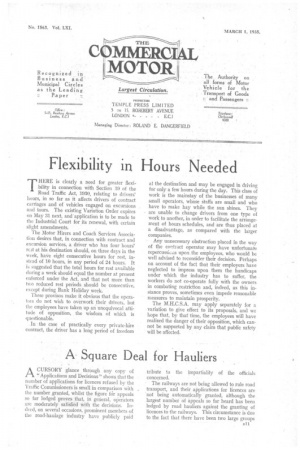Flexibility in Hours Needed
Page 25

If you've noticed an error in this article please click here to report it so we can fix it.
THERE is clearly a need for greater flexibility in connection with Section 19 of the Road Traffic Act, 1930, relating to drivers' hours, in so far as it affects drivers of contract carriages and of vehicles engaged on excursions and tours. The existing Variation Order expires on May 31 next, and 'application is to be made to the Industrial Court for its renewal, with certain slight amendments.
The Motor Hirers and Coach Services Association desires that, in connection with contract and excursion services, a driver who has four hours' rcst at his destination should, on three days in the week, have eight consecutive hours for rest, instead of 10 hours, in any period of 24 hours. It is suggested that the total hours for rest available during a week should equal the number at present enforced under the Act, and that not more than two reduced rest periods should be consecutive, except during Bank Holiday week.
These provisos make it obvious that the operatois do not wish to overwork their drivers, but the employees have taken up an unequivocal attitude of opposition, the wisdom of which is questionable.
In the case of practically every private-hire contract, the driver has a long period of freedom at the destination and may be engaged in driving for only a few hours during the day. This class of work is the mainstay of the businesses of many small operators, whose staffs are small and who have to make hay while the sun shines. They are unable to change drivers from one type of work to another, in order to facilitate the arrangement of hours schedules, and are thus placed at a disadvantage, as compared with the larger companies.
Any unnecessary obstruction placed in the way of the contract operator may have unfortunate repercussiees upon the employees, who would be well advised to reconsider their decision. Perhaps on account of the fact that their employers have neglected to impress upon them the handicaps under which the industry has to suffer, the workers do not co-operate fully with the owners in combating restriction and, indeed, as this instance proves, sometimes even impede reasonable measures to maintain prosperity.
The M.H.C.S.A. may apply separately for a variation to give effect• to its proposals, and we hope that, by that time, the employees will have realized the danger of their opposition, which cannot be supported by any claim that public safety will be affected.




























































































